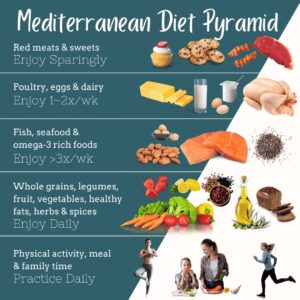The Mediterranean Way and Why It Is Healthy
go.ncsu.edu/readext?866791
en Español / em Português
El inglés es el idioma de control de esta página. En la medida en que haya algún conflicto entre la traducción al inglés y la traducción, el inglés prevalece.
Al hacer clic en el enlace de traducción se activa un servicio de traducción gratuito para convertir la página al español. Al igual que con cualquier traducción por Internet, la conversión no es sensible al contexto y puede que no traduzca el texto en su significado original. NC State Extension no garantiza la exactitud del texto traducido. Por favor, tenga en cuenta que algunas aplicaciones y/o servicios pueden no funcionar como se espera cuando se traducen.
Português
Inglês é o idioma de controle desta página. Na medida que haja algum conflito entre o texto original em Inglês e a tradução, o Inglês prevalece.
Ao clicar no link de tradução, um serviço gratuito de tradução será ativado para converter a página para o Português. Como em qualquer tradução pela internet, a conversão não é sensivel ao contexto e pode não ocorrer a tradução para o significado orginal. O serviço de Extensão da Carolina do Norte (NC State Extension) não garante a exatidão do texto traduzido. Por favor, observe que algumas funções ou serviços podem não funcionar como esperado após a tradução.
English
English is the controlling language of this page. To the extent there is any conflict between the English text and the translation, English controls.
Clicking on the translation link activates a free translation service to convert the page to Spanish. As with any Internet translation, the conversion is not context-sensitive and may not translate the text to its original meaning. NC State Extension does not guarantee the accuracy of the translated text. Please note that some applications and/or services may not function as expected when translated.
Collapse ▲If you’re looking for a heart-healthy eating plan, the Mediterranean diet might be right for you. The Mediterranean diet incorporates the basics of healthy eating — plus a splash of flavorful olive oil.
Most healthy diets include fruits, vegetables, fish and whole grains, and limit unhealthy fats. Summertime is an easy way to start your healthy diet with the abundance of fresh fruits and vegetables available in our county.
Benefits of the Mediterranean diet
Research has shown that the traditional Mediterranean diet reduces the risk of heart disease, and reduces the incidence of cancer, and Parkinson’s and Alzheimer’s diseases. Women who eat a Mediterranean diet supplemented with extra-virgin olive oil and mixed nuts may have a reduced risk of breast cancer.
For these reasons, most if not all major scientific organizations encourage healthy adults to adopt a style of eating like that of the Mediterranean diet for the prevention of major chronic diseases.
Key components of the Mediterranean diet
The Mediterranean diet emphasizes:
- Eating primarily plant-based foods, such as fruits and vegetables, whole grains, legumes and nuts
- Replacing butter with healthy fats such as olive oil and canola oil
- Using herbs and spices instead of salt to flavor foods
- Limiting red meat to no more than a few times a month
- Eating fish and poultry at least twice a week
- Enjoying meals with family and friends
- Drinking red wine in moderation (optional)
- Getting plenty of exercise
How do you eat the Mediterranean way?
- Eat a variety of fruits and vegetables at every meal
- Go for lean protein options, such as fish and chicken
Make all your grains whole-grain options – such as whole-wheat bread, brown rice, and oatmeal
Choose nuts and seeds as snacks Use healthy fats, such as olive and canola oil – limit your saturated fats, such as butter and margarine
Learn more about the Mediterranean Way Cooking. Get started today for a healthy you!





